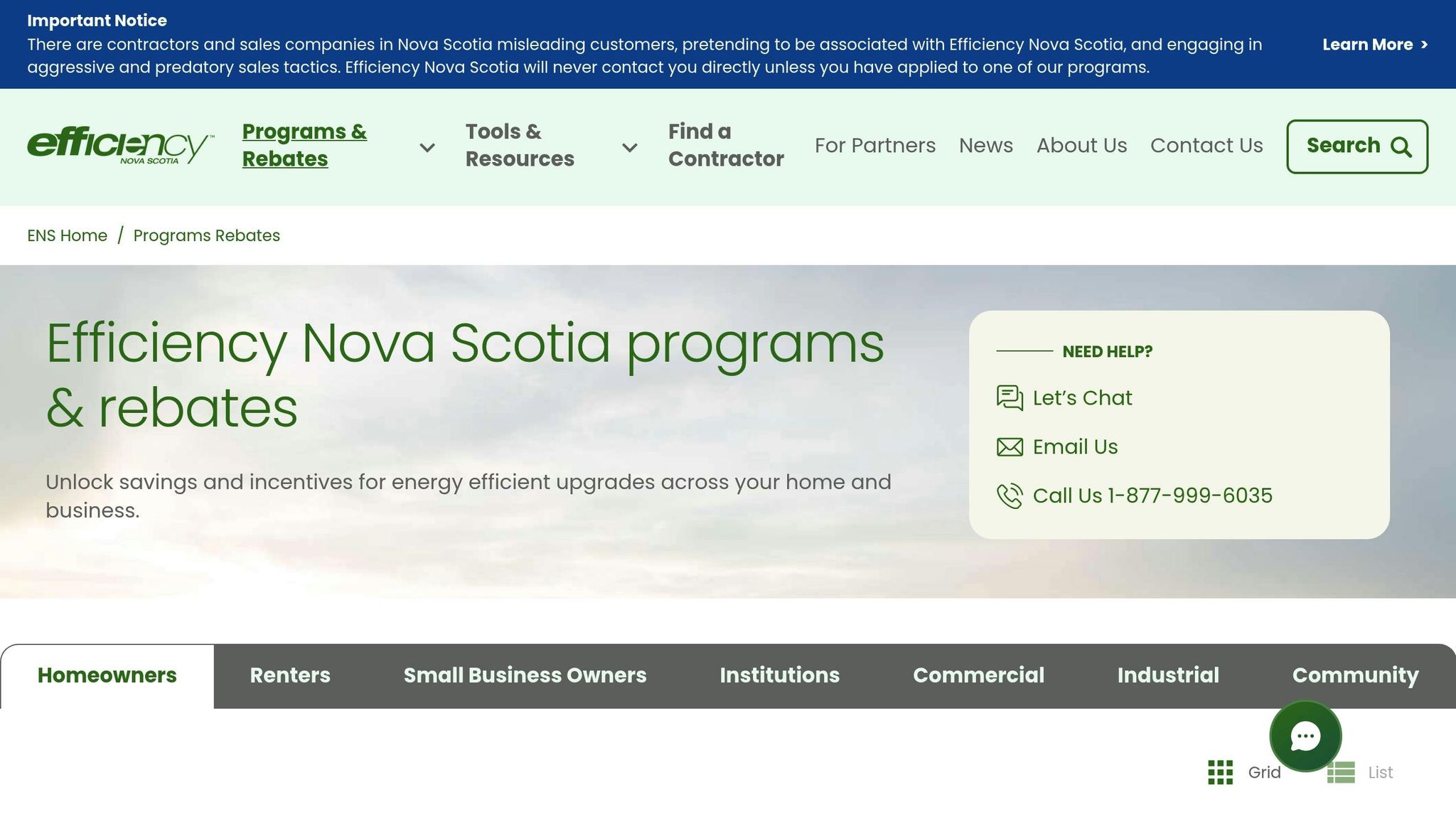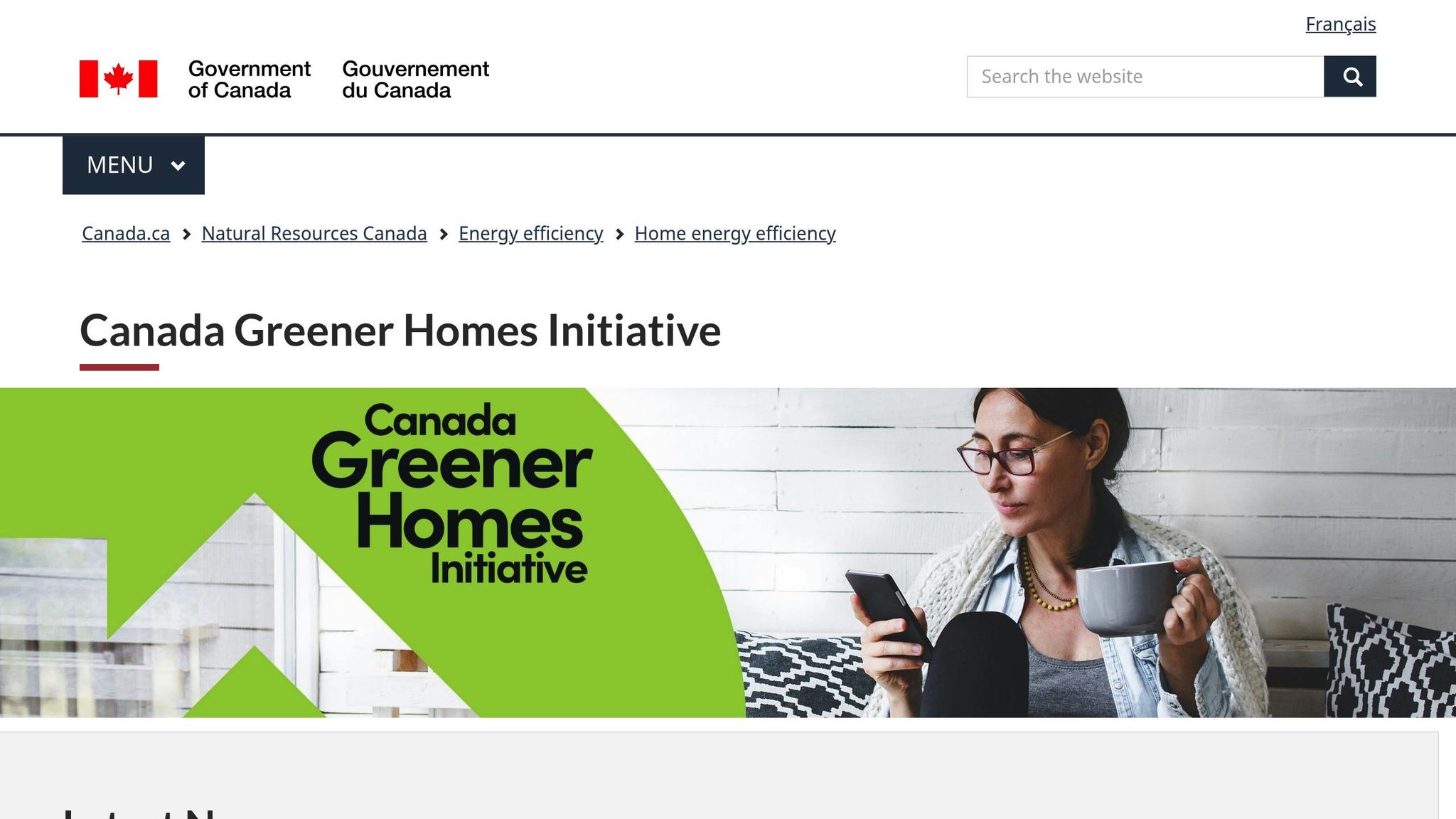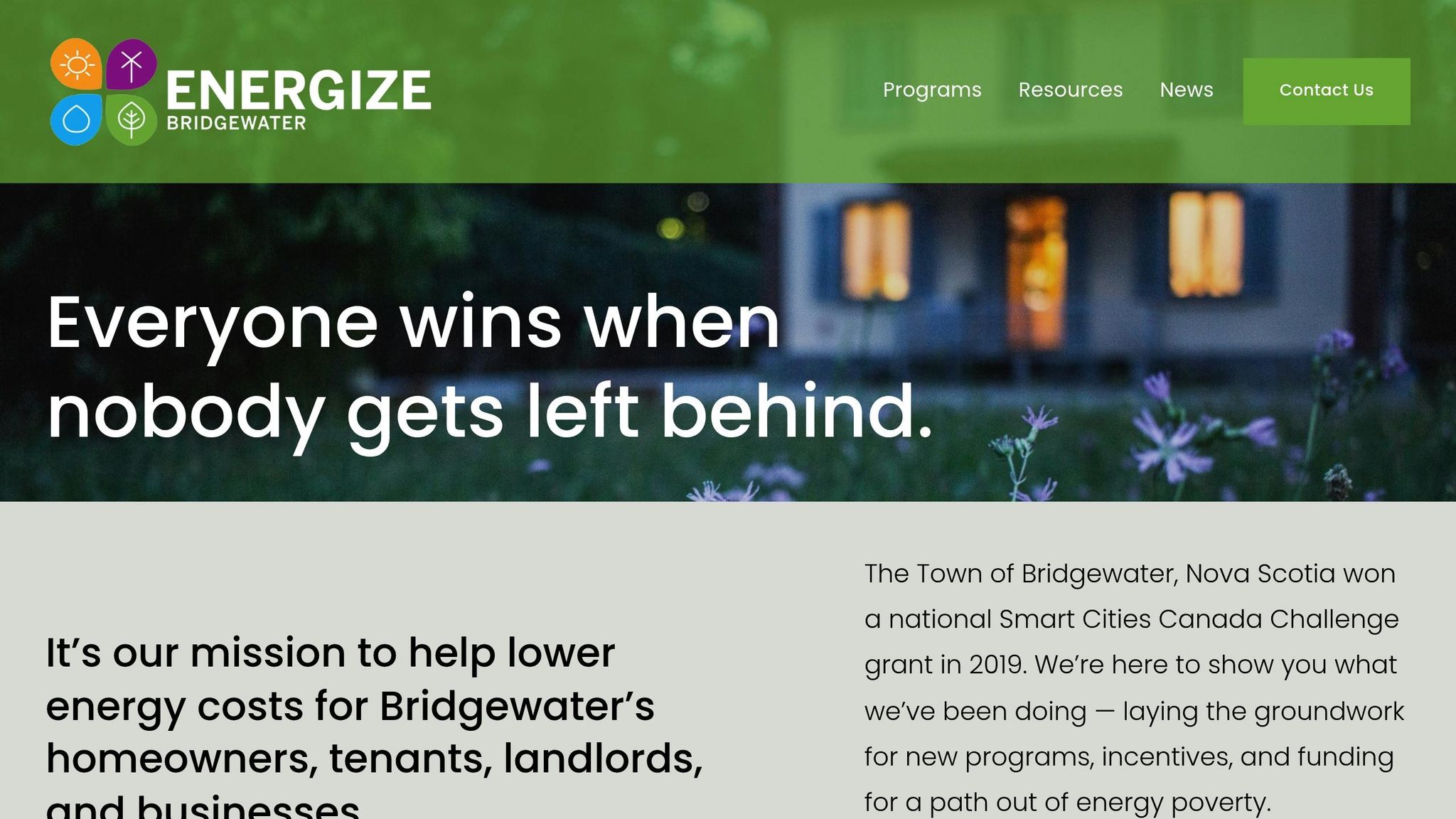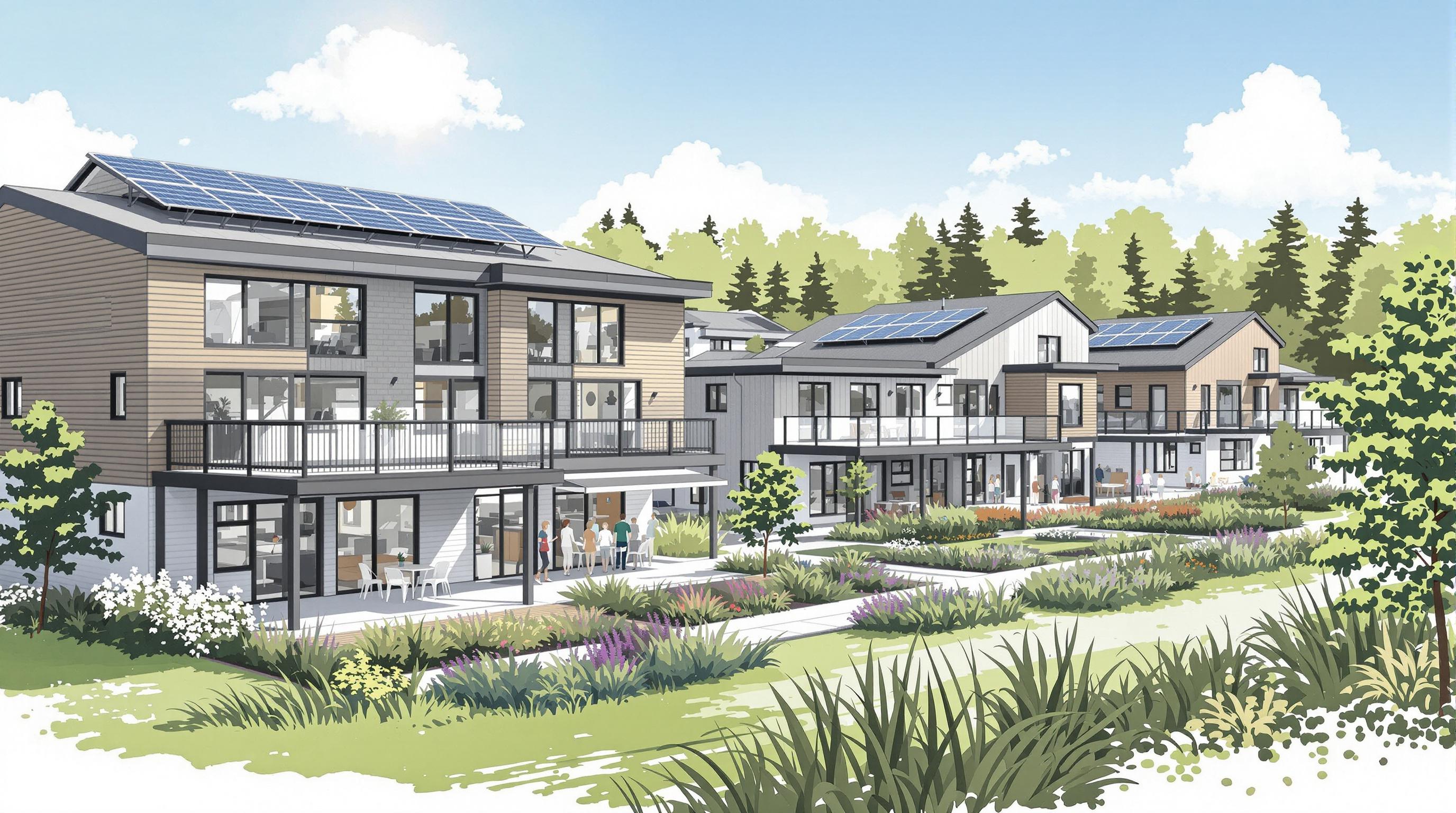Energy Rebates for Multi-Unit Housing in Nova Scotia
Energy rebates in Nova Scotia can save developers up to $52 per square foot on construction costs while boosting long-term property value and reducing carbon emissions. With programs like Efficiency Nova Scotia, Canada Greener Homes Initiative, and Energize Bridgewater, developers can access grants, loans, and rebates for energy-efficient designs. These incentives help lower upfront costs, increase rental income, and improve ROI - up to 262% compared to 116% with standard builds.
Key Benefits:
- Lower Costs: Reduce construction expenses from $220 to $168 per sq. ft.
- Higher ROI: Up to 262% return on equity at refinance.
- Rental Income: Generate $4,400–$9,600 monthly with energy-efficient designs.
- Faster Builds: Complete projects in 6 months vs. the 12-month average.
- Environmental Impact: Reduced carbon emissions with efficient upgrades.
How to Apply:
- Book an energy assessment with Efficiency Nova Scotia.
- Submit pre-approval with project plans and contractor quotes.
- Complete upgrades with approved contractors.
- Finalize with follow-up assessments and submit required documents.
Energy-efficient buildings are not just cost-effective - they attract tenants, offer higher appraised values, and create immediate equity. Start planning early to take full advantage of these rebate programs.
Energy Efficiency Rebates Presentation
Current Energy Rebates in Nova Scotia
Nova Scotia has several energy rebate programs aimed at helping multi-unit housing developers reduce the upfront costs of energy-efficient construction. These programs offer financial assistance to improve building performance and make energy-saving upgrades more affordable.
Efficiency Nova Scotia Programs

Efficiency Nova Scotia plays a key role in advancing energy efficiency for multi-unit properties. Its programs include home energy assessments, upgrades for rental properties, and options for integrating renewable energy. These initiatives help developers improve energy performance while sharing the financial burden of initial costs.
Canada Greener Homes Initiative

On a national scale, the Canada Greener Homes Initiative offers grants, interest-free loans, and energy assessments to support large-scale retrofit projects. This program enables property owners to undertake major energy-saving upgrades while easing the financial strain of upfront expenses.
Energize Bridgewater Program

In Bridgewater, the Energize Bridgewater Program offers rebates and financing options tailored to local energy improvements. These include upgrades like advanced heat pump systems and enhancements to building envelopes, helping to lower energy consumption and improve efficiency.
Who Can Get Energy Rebates
Building Requirements
To qualify for Nova Scotia's energy rebates, multi-unit properties must meet specific criteria. Eligible buildings must be residential, have at least two units, and be located within the province. The property's current energy performance and age are key factors in determining eligibility.
For new construction, projects must exceed the energy performance standards of the National Energy Code of Canada for Buildings (NECB) by at least 15%. Smaller properties, such as duplexes, triplexes, and fourplexes, can access both provincial and federal incentives if they meet these higher efficiency standards. Achieving these benchmarks increases the likelihood of qualifying for the rebate programs.
Special Program Rules
Certain programs provide additional benefits for non-profit and affordable housing initiatives. For example, multi-unit properties classified as affordable housing may receive rebates up to twice the standard amount through Efficiency Nova Scotia.
Rural and low-income areas may also qualify for extra funding. These provisions are designed to make energy efficiency upgrades more accessible in communities where financial barriers might otherwise prevent such improvements.
Required Documents
When applying for energy rebates, property owners and developers need to provide the following:
- Proof of ownership or development rights
- An energy assessment report (no older than 12 months)
- Project plans outlining energy upgrades
- Cost estimates from contractors
- Building permits and approvals
For new construction projects, additional documents are required:
- Energy modelling reports detailing efficiency improvements
- Construction drawings highlighting energy-efficient features
- Documentation of renewable energy plans (if applicable)
- Contractor certifications
Applications must include an energy assessment conducted by a certified energy advisor registered with Natural Resources Canada or Efficiency Nova Scotia. These assessments are essential for establishing the property's current energy performance and identifying potential upgrades. This documentation forms the foundation for the rebate application process, which will be discussed in the next section.
sbb-itb-16b8a48
How to Apply for Rebates
Booking an Energy Assessment
Start by arranging an energy assessment with a certified advisor. Reach out to Efficiency Nova Scotia to connect with a qualified assessor. These experts will review your property's energy performance and suggest upgrades to improve efficiency. They’ll also identify rebates you might qualify for. The assessment report usually includes details like your current energy use, recommended improvements, estimated cost savings, and available rebate options. Use this information to prepare your pre-approval application.
Steps for Pre-Approval
Before beginning any upgrades or construction, submit your pre-approval application to the appropriate rebate program. Typically, this involves:
- Filling out the necessary application forms for the program
- Including your energy assessment report
- Providing detailed project plans
- Adding contractor quotes and specifications
For new construction projects, it’s important to incorporate energy-efficient designs from the outset. For instance, Helio Urban Development includes energy-efficient features in their pre-designed multi-unit properties, helping investors qualify for rebates while keeping construction costs around $168–$184 per square foot.
Completing the Work and Receiving Payment
After your application is approved, you can move forward with the upgrades or construction. Keep these points in mind:
- Hire contractors approved by the rebate program
- Take photos and keep receipts for all completed work
- Schedule a follow-up energy assessment once the work is done
- Submit all final paperwork within the program’s deadlines
Payment timelines can vary depending on the rebate program, so check the guidelines for details on processing times and payment methods. Helio Urban Development also uses an AI-driven scheduling system to streamline construction timelines and ensure everything stays on track.
Make sure to maintain clear communication and organize all necessary documents (photos, receipts, reports) to avoid delays in receiving your rebate.
Why Energy Rebates Matter
Money Saved and Earned
Energy rebates can lead to both immediate and long-term savings for multi-unit projects in Nova Scotia. By incorporating energy-efficient designs, construction costs can decrease significantly - from $220 to as low as $168 per square foot [1].
For example, a duplex project in Colchester was built at $165 per square foot and appraised at $830,000, providing the developer with instant equity. This property now generates $4,400 in monthly rental income with full occupancy [1]. These savings directly boost project equity and improve overall investment returns.
Lower Carbon Output
In addition to financial savings, energy rebates contribute to reduced carbon emissions. Features of efficient designs include:
- Improved insulation
- High-performance windows and doors
- Energy-efficient heating and cooling systems
- Smart thermostats
- LED lighting
These upgrades not only lower utility costs for tenants but also enhance tenant satisfaction and encourage longer leases. Property owners often find that these benefits lead to higher occupancy rates.
Better Property Value
Savings and environmental benefits also make properties more attractive in the market. Energy-efficient buildings tend to have higher appraised values and appeal to quality tenants. Here's a quick comparison:
| Aspect | Traditional Build | Energy-Efficient Build |
|---|---|---|
| Construction Cost | $220/sq. ft. | $168/sq. ft. |
| Return on Equity at Refinance | 116% | 262% |
| Immediate Equity Creation | Base | Up to $166,400 extra |
One standout example is a 4-plex project where the developer locked in construction costs at $173 per square foot. The project was completed in just nine months, with all units pre-leased before completion, generating $9,600 in monthly rental income [1].
"I've built before and was burned by endless 'surprise' bills. With Helio, the final price never changed - even when materials got scarce. I'd trust them again in a heartbeat." - Sonia M., Rental Property Owner [1]
The combination of reduced operating costs and increased rental income improves net operating income (NOI), which raises the property's appraised value. Energy-efficient properties often command higher rents while offering lower utility costs, creating a win-win for both investors and tenants.
Key Points to Remember
Several factors can influence the success and profitability of multi-unit energy rebate projects in Nova Scotia.
Start Early with Planning
Begin researching rebates early in your project. Building energy-efficient properties at $168/sq. ft. can create immediate equity compared to standard construction costs. This benefit grows when paired with programs like Efficiency Nova Scotia or the Canada Greener Homes Initiative.
Keep Your Records in Order
Detailed documentation is crucial. Proper energy assessments and thorough records ensure you qualify for rebates. Plus, these practices can lead to greater project savings overall.
Financial Benefits Add Up
Energy-efficient construction offers both upfront savings and long-term revenue opportunities:
| Benefit Type | Impact Range |
|---|---|
| Initial Savings | Up to $52/sq. ft. in construction costs |
| ROI at Refinance | Up to 262% compared to 116% standard ROI |
| Monthly Revenue | $4,400–$9,600 |
| Construction Timeline | 6 months versus the 12-month average |
Boost Long-Term Value
Energy-efficient buildings tend to perform better over time, maintaining high occupancy rates and providing reliable rental income.
Faster Construction, Better Results
Fixed-price contracts help control costs while ensuring energy efficiency. Shorter build times - around 6 months compared to the standard 12 months - mean you can start generating rental income sooner. This could add an extra $48,000 in revenue during the first year alone [1].
